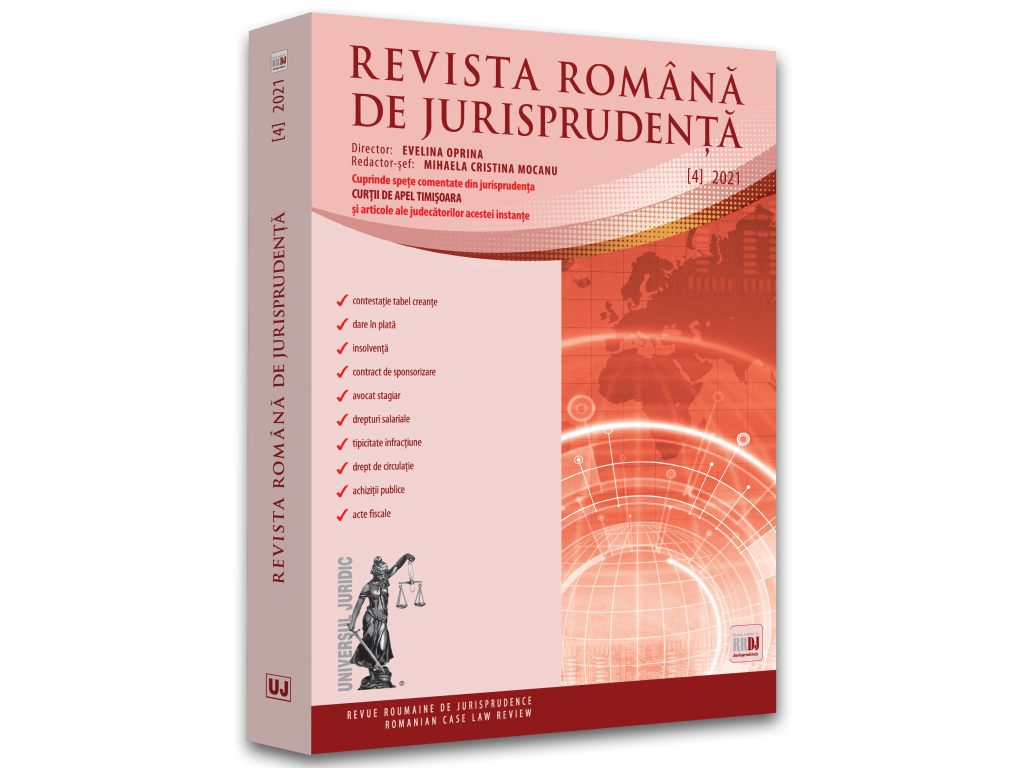The transfer of the use of goods by means of a commodatum contract, concluded by the individual (PF) as the lessor and the authorised individual (PFA) as lessee. Identical PF and PFA.
DREPTUL AFACERILOR/ASPECTE DE DREPT PROCESUAL
Abstract
From the combined interpretation of the provisions of Art. 2 para. (1) letter i) of GEO no. 44/2008 and Art. 25 para. (2) of the Civil Code, it follows that the individual who has obtained the authorisation to carry out certain income-generating activities is the same as the individual himself, there being no two distinct individuals.
Also, in relation to the provisions of Article 2 para. (1) letter j) of GEO no. 44/2008 (which define the assets of the beneficiary as the totality of the assets, rights and obligations of the authorised individual constituted as a fraction of the assets of the authorised individual) and the provisions of Art. 32 para. (2) of the Civil Code (which stipulates that in the case of an assignment, the transfer of rights and obligations from one set of assets to another does not constitute an alienation), it follows that the assets are unique and that the use of some of the assets for the purpose of carrying out an authorised activity does not lead to another conclusion, since there is no transfer of ownership.
The income earned by the authorised individual from the exploitation of the individual's property is the income of the individual. Likewise, the expenses incurred (obligations assumed) in order to enhance the assets exploited by the authorised individual are also expenses (obligations) of the individual, who is also liable for all the obligations assumed in the framework of the authorised activity, to the extent that the assets of the assets of the allocation patrimony are not sufficient, with his own assets, according to the provisions of art. 20 of GEO no. 44/2008.
The provisions of Article 62 para. (1) final sentence of Law no. 573/2003 and Art. 84 of Law no. 227/2015 (according to which the gross income is increased by the amount of the expenses which, according to the legal provisions, are the responsibility of the owner, beneficial owner or other legal holder, if they are carried out by the other contracting party), refer to the transfer of use to another beneficiary. Only an expense borne by another person can be considered a benefit to the property owner. However, where the expenditure is borne by the owner of the property, even if that expenditure was incurred in the course of the activity for which the owner of the property was authorised as a PFA, it cannot in any case be regarded as an advantage, since his income has been reduced by the amount of that expenditure.
When, following the cessation of the activity of the PFA, a tax decision was issued on behalf of the individual, covering the activity of the PFA, and when the identity of person was claimed by the tax authority itself, the court practice, including that of the Timisoara Court of Appeal, retained that identity of person and ordered the individual to pay the tax debts accrued during the period of the authorised activity, even though the PFA was already deregistered at the date of the tax decision. The identity of person must therefore also be taken into account in terms of the rights, not just the obligations, of such person.
Amounts representing building renovation expenses, incurred by the PFA directly or by re-invoicing, do not represent income for the individual, and any increase in the value of the building is only relevant for the purposes of the tax on buildings.








